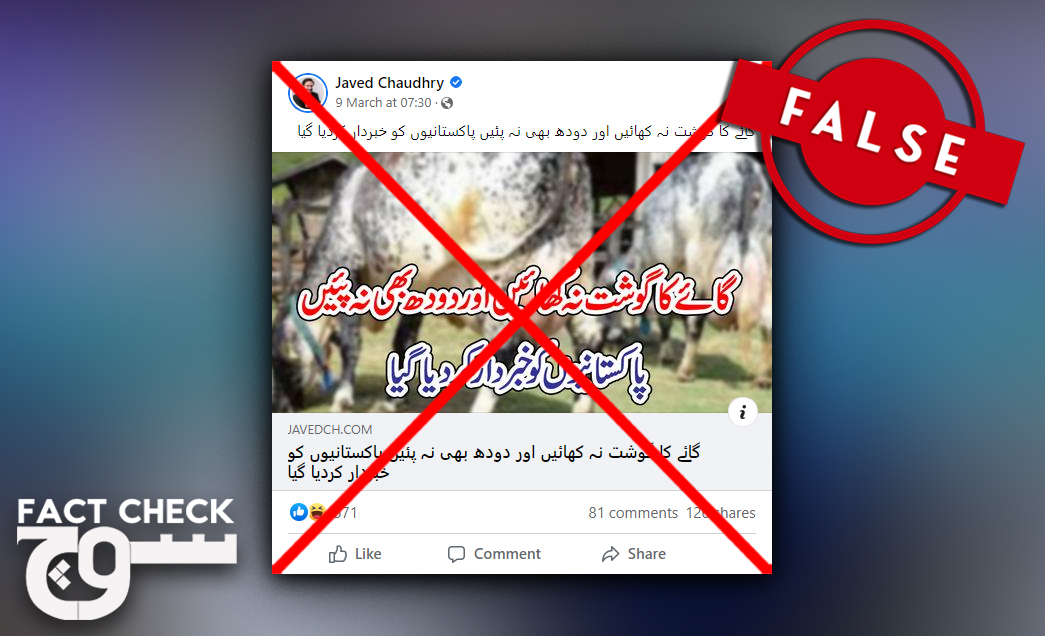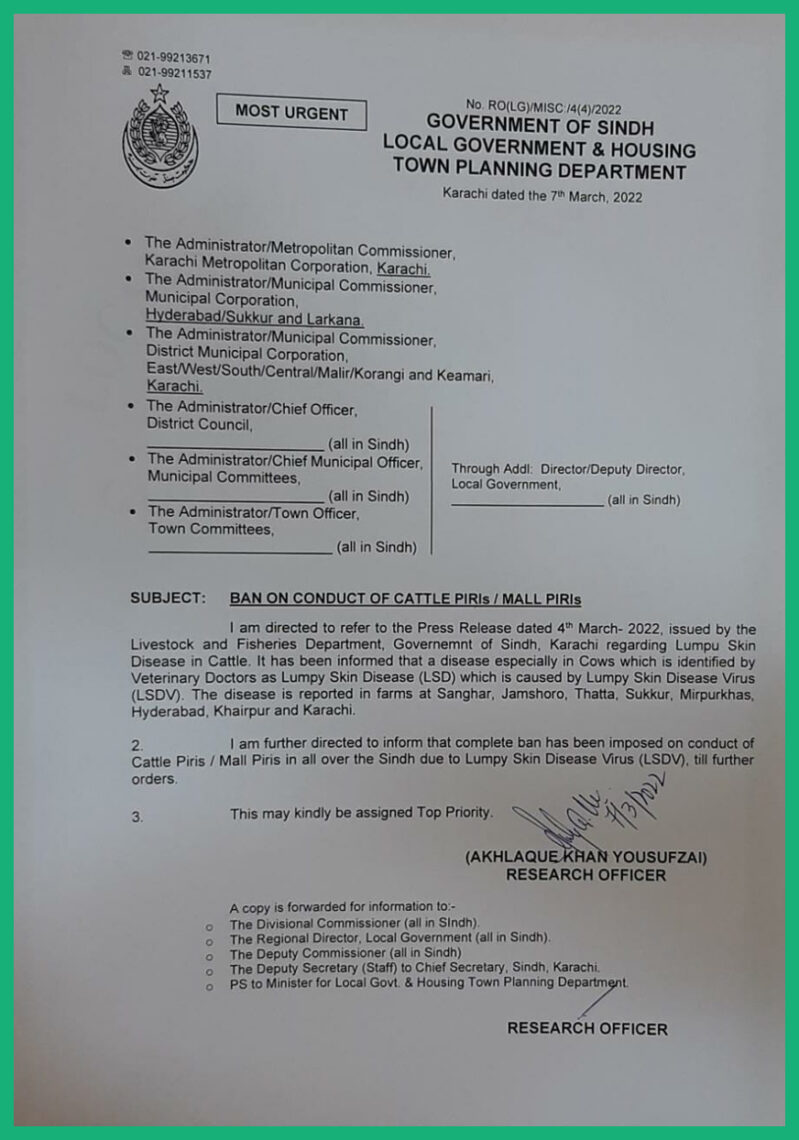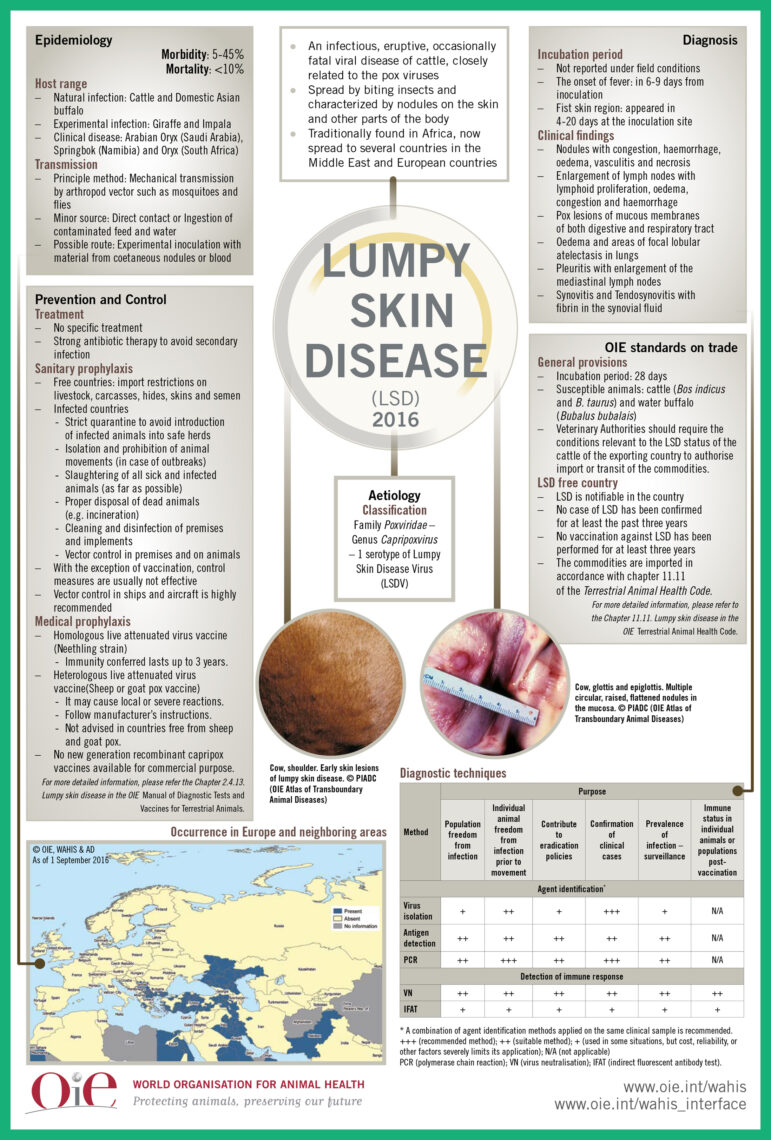
Claim: A WhatsApp voice message warns people not to consume beef, loose milk, and yoghurt due to the Lumpy Skin Disease Virus (LSDV) that has infected cattle in Karachi and can transmit to humans, causing blisters. The WhatsApp message was accompanied by an image of a notification issued by a Government of Sindh department.
Fact: LSDV cannot infect humans and it remains safe to consume meat and dairy products. Experts have advised standard precautions when handling and cooking meat.
On 8 March 2022, Soch Fact Check received a voice message on WhatsApp explaining that a disease has spread among cattle in Karachi and claiming that it can transmit to humans on consumption of cow meat, loose milk or yoghurt. According to the message, once transmitted, the disease causes blisters to appear on the human body.
An image of a notification issued by the Sindh Government’s Local Government and Housing Town Planning departments was sent alongside the voice message.
The text of the notification has been reproduced as follows:
“SUBJECT: BAN ON CONDUCT OF CATTLE PIRIs / MALL PIRIs
I am directed to refer to the Press Release dated 4th March- 2022, issued by the Livestock and Fisheries Department, Governemnt of Sindh, Karachi regarding Lumpu Skin Disease in Cattle. It has been informed that a disease especially in Cows which is identified by Veterinary Doctors as Lumpy Skin Disease (LSD) which is caused by Lumpy Skin Disease Virus (LSDV). The disease is reported in farms at Sanghar, Jamshoro, Thatta, Sukkur, Mirpurkhas, Hyderabad, Khairpur and Karachi.
2. I am further directed to inform that complete ban has been imposed on conduct of Cattle Piris / Mall Piris in all over the Sindh due to Lumpy Skin Disease Virus (LSDV), till further orders
3. This may kindly be assigned Top Priority.”
The message has led to considerable paranoia and confusion, with many people wondering whether it is appropriate to consume beef and dairy products, whether the disease can indeed infect humans, and whether the government has imposed a ban on cattle meat.
Fact or fiction?
The government of Sindh confirmed the spread of LSDV among cattle in the province in its notification dated 7 March 2022 (the text of which is reproduced above).

Livestock & Fisheries Department Director-General Dr Nazeer Hussain Kalhoro clarified in a video on Facebook that the confirmation came after symptoms of the disease were observed in South Punjab and some districts of Sindh.
However, the disease is not zoonotic, meaning that it is not transmissible to humans. There is no risk to humans in consuming beef and dairy products, provided standard precautions are taken when handling and cooking meat.
In his video uploaded to Facebook, Dr Kalhoro said, “The disease poses no danger to humans or their health as it has not been transmitted to humans anywhere in the world. Meat and milk are safe to consume. The disease is very specific to animals, i.e. it was not found in our goats and sheep nor in buffaloes in Sindh.”
All relevant documents issued by the Government of Sindh are available here.
Speaking to Soch Fact Check, Dr Kalhoro confirmed that the notification that accompanied the WhatsApp voice message is authentic; however, it only mentioned a “complete ban [… ] on conduct of Cattle Piris / Mall Piris in all over the Sindh”, which means the ban applies to the operation of cattle markets.

The Aga Khan University Hospital Pakistan (AKUH) also issued a statement regarding LSDV. According to Dr. Nosheen Nasir, an Infectious Diseases consultant at AKUH, “So far, transmission to humans has not been reported.”
“We should take all standard precautions when cooking and cleaning meat. We can consume meat which is thoroughly cooked and properly washed. Remember to wash your hands after handling any meat and only consume boiled or pasteurised milk,” Dr. Nasir said.
The AKUH added in a second statement that there was “no clinical research study conducted to corroborate these claims as mentioned in the social and broadcast media”.
Moreover, the World Organisation for Animal Health — which was formerly known as the Office International des Epizooties (OIE) — said in its Technical Disease Card on LSDV on 24 March 2021 that the virus is “highly host specific and causes diseases only in cattle (Bos indicus and B. taurus) and water buffalo” and that it is “not zoonotic”.
According to Chapter 3.4.12. of the OIE’s Manual of Diagnostic Tests and Vaccines for Terrestrial Animals 2021, “Strains of LSDV are not a hazard to human health.”
In its fact-check regarding LSDV in pigs in Thailand, AFP Fact Check — a signatory of the International Fact-Checking Network (IFCN) — quoted Deputy Director-General of Thailand’s Department of Livestock Development Dr Chaiwat Yotakon as saying, “Humans and pigs cannot contract the disease. As for concerns that the disease will affect consumers of beef, the lumpy skin disease cannot enter the muscle cells of cattle.”
AFP Fact Check also cited Kachen Wongsathapornchai, regional manager for the Emergency Centre for Transboundary Animal Diseases, Food and Agriculture Organisation of the United Nations (FAO), who said on June 21, 2021, “Humans will not contract the disease from either direct contact or consumption of meat from LSD-infected animals.”
As far as the infection in cattle is concerned, the OIE recommends two vaccines to curb the spread, the homologous live attenuated virus vaccine (Neethling strain) and the heterologous live attenuated virus vaccine (Sheep or goat pox vaccine).
As of 1 September 2016, LSDV was not detected in any South Asian country other than Pakistan. If no case of LSDV is detected for a three-year period, a country is considered LSDV-free.
Soch Fact Check can, therefore, conclude that LSDV is not readily transmitted to humans and beef, as well as dairy products, are safe to consume.
Virality
Soch Fact Check conducted a CrowdTangle analysis for the past 30-day period using the following search terms:
- “گوشت نہ کھائیں
[Do not eat meat]” - “گوشت کان پرهيز ڪن
[Avoid consuming meat]” - “گوشت پابندي
[Restriction on meat]” - “گائے کا گوشت نہ کھائیں اور دودھ بھی نہ پئیں پاکستانیوں کو خبردار کردیا گیا
[Do not eat cow meat and do not drink milk either; Pakistanis have been warned]” - “خبردار پاکستانیوں!! گائے کا گوشت نہ کھائیں اور دودھ بھی نہ پئیں
[Beware Pakistanis!! Do not eat cow meat and do not drink milk either]” - “لمپی گائے گوشت
[Lumpy cow meat]”
The first search term was the most popular one as the analysis turned up 97,659 interactions across 2,164 posts. The second search term received 1,602 interactions across 44 posts. The third, fourth, and fifth search terms also gained traction, with 50 posts receiving more than 1,400 interactions, five posts receiving over 800 interactions, and 11 posts receiving close to 1,000 interactions, respectively. The sixth search term turned up more than 10,200 interactions across over 180 posts.
The report was also shared by the verified Facebook page of journalist ‘Javed Chaudhry’. It was then published here, here, here, here, and here by multiple news-gathering websites, which, as Soch Fact Check has previously noted, tend to post pieces under clickbait headlines. These websites often have identical or near-identical text in their stories and, although not certain, appear to be run by the same people or organisations.
Facebook pages such as ‘National News’, ‘UrduBiz.com’, ‘92 Urdu News’, ‘Dunya News Network’, ‘Daily Pak’, ‘Awami News’, ‘News1’, and ‘National News’ also shared the report.
Conclusion: The WhatsApp voice message is misleading as LSDV is not transmissible to humans. Experts say it is safe to consume beef, loose milk, and yoghurt, provided that standard precautions are taken when handling and cooking meat.
